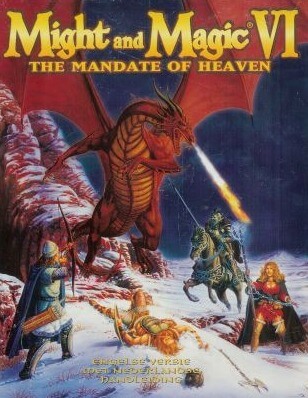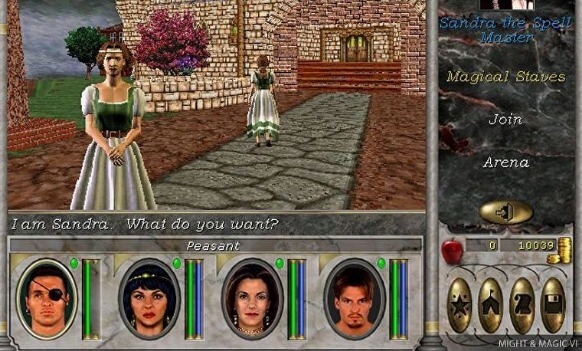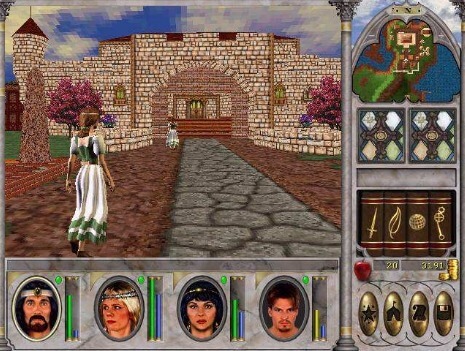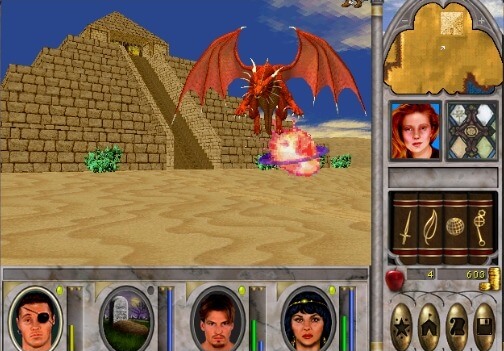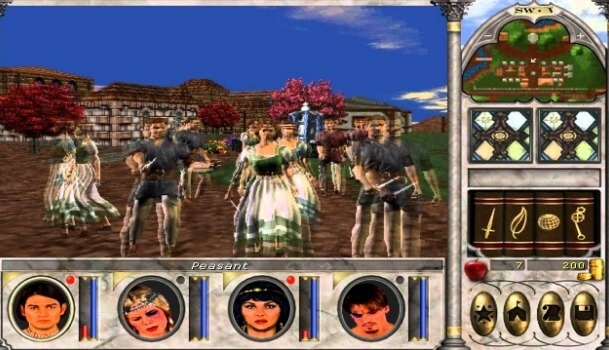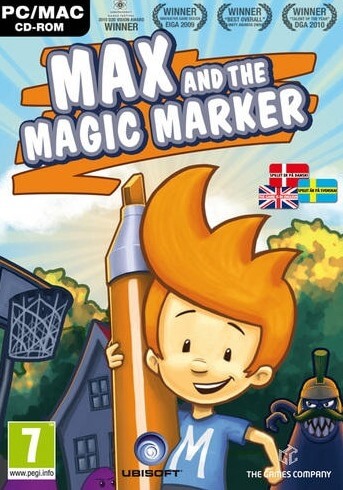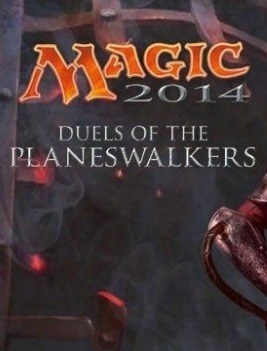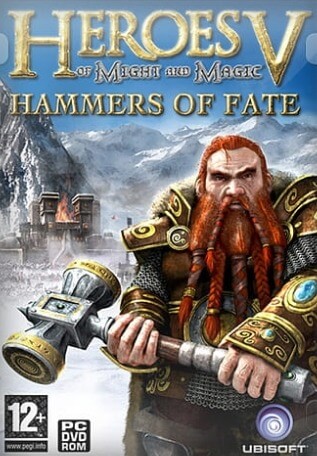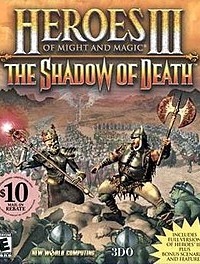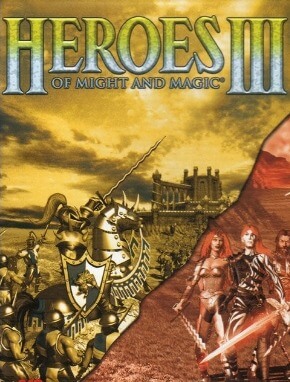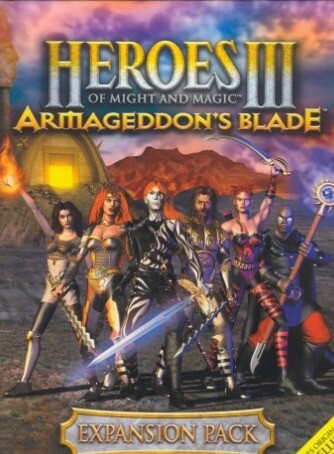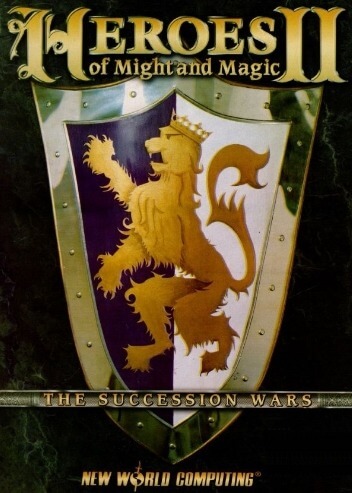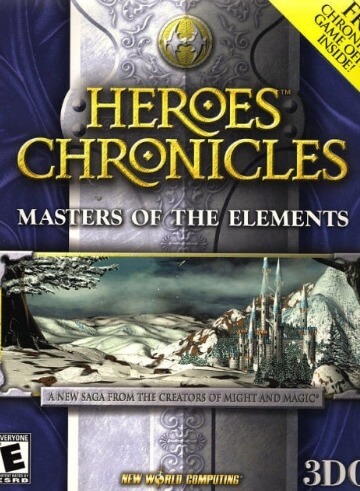Apart from the main quest line, there are a number of side and promotion quests available to take on, but although they are not abundant, most are detailed in their setup and planning. Because the game operates under a calendar schedule with a day and night system, the time of year affects the availability of several scheduled events, such as the Solstices and the presence of the Circus of the Sun.
Character Creation & Improvement
Uniquely for the series, Might and Magic VI is the first and only Might and Magic title to offer players no choice regarding race: all playable characters are human. Each character is created by first choosing them a portrait (offering either a male or female appearance and voice to match), providing them a name, and then choosing one of six class that are available in the game for use: Knight, Druid, Paladin, Cleric, Sorcerer and Archer. The class chosen for a character determines what skills they can use in the game including which two are preset for them (e.g. Archers begin with Bow from the start), and how their two primary stats (Health and Magic Points) are set up. Players can modify a character further in creation by selecting two more skills to complement their class, along with improving their ability score by adding or subtracting points from one of seven statistics, all of which are carried over from the previous instalments: Might, Intellect, Personality, Endurance, Accuracy, Speed and Luck. Characters age as game time passes (as well as through detrimental spells and potions), and so begin at roughly twenty years old, receiving statistic penalties upon going beyond fifty years of age.
Characters can be improved after party creation in a number of ways. By fighting enemies, completing quests, and through other means, each character can earn experience towards advancing to a new level, although doing so requires the use of a training centre in a settlement in order to earn increases to health and magic points. Improving their other statistics, including resistances to magic, can be done by finding and using various items in the game world - barrels, cauldrons, shrines, wells and fountains - along with drinking certain potions. Characters can further improve themselves by taking on promotion quests for their class, which provide greater benefits as a result of increasing to a higher tier along with a change in title (i.e. Paladins that are promoted, become Crusaders). Characters can only receive two promotions for their class and must earn their first promotion before attempting to work on earning their second promotion, while characters not of the same class receive just an honorary promotion; classes not used can still have their promotion quests undertaken during a playthrough.
Skill Point System
The game's skill point system affords the player an uncommon degree of liberty in further character improvement. More skills can be acquired for a character after party creation through various guilds across Enroth, but what can be learned depends on their class. While many adventuring skills, such as Repair and Merchant, are fully available to all classes, most weapon, armour and magic skills are restricted to certain character classes (i.e. Sorcerers can't use swords or plate armour), although advancement in learned skills is not restricted by class: an archer, for example, can become just as skilled at using a sword as a knight can.
Each skill consists of two factors to it - Rank and Expertise, of which the latter is divided into three levels: Normal, Expert and Master. While a skill's Rank can be improved (up to a maximum of 60) by spending points earned from advancing a character in level or using special items, the amount needed to reach a new rank increases over time - a skill of Rank 2 would need 2 points to advance, but then need 3 points to advance past its new rank, then 4 points, and so forth. To improve a skill's Expertise, characters must find and gain training from a teacher of the respective skill. While there are a number of teachers available who can raise a skill to Expert and have basic pre-requisite for their training (money and a certain skill Rank), each skill has only one Master teacher; their location is known by Expert teachers, yet their pre-requisites are greater, with some requiring a character to have a stat at a certain amount, and even having gotten a class promotion. By achieving a higher level of expertise, a character can gain bonuses to compliment it, such as being able to maintaining a spell's beneficial effect for much longer. Thus, a Knight who is level 20 could achieve a better expertise of Sword skill and thus become more powerful in later battles.
While the skill system in The Mandate of Heaven was relaxed, in later sequels it was made considerably more restrictive in terms of expertise; although a new level was added in, a character's class restricted how high it went.
Plot
With the problem of the corrupt Guardian, Sheltem, finally dealt with in Might and Magic V: Darkside of Xeen, the 1500-year war between the Ancients and a Devil-like race of alien beings, the Kreegans, spills over into nearby planets. One of these is the world of Enroth, on which a continent-nation of the same name lies. Seven years after the events of Heroes of Might and Magic II: The Succession Wars, on a day later to be known as the Night of Shooting Stars, meteor-like spaceships fall from the Void, infested with Kreegans. The king of Enroth, Roland Ironfist, departs north with an army seeking to attack the devil-like creatures, but he is betrayed by a traitorous air mage named Sulman. Roland's forces are ambushed by an enormous Kreegan army, and he, his court wizard Tanir, and the noble Sir Ragnar are captured, while the rest of the Enrothian forces are devastated. The Kreegan King Xenofex secretly establishes the Temple of Baa, a doomsday cult dedicated to removing the Ironfist dynasty from power. With their King missing and his young son, Prince Nicolai, left to rule the kingdom alongside Regent Wilbur Humphrey, the people of Enroth begin to fear that the Ironfists have lost the "Mandate of Heaven" (the divine right to rule). The four player characters are from the town of Sweet Water, which is attacked and overwhelmed by the Kreegan invaders. Falagar, a powerful warlock, intervenes and teleports them to safety, where he trains them until they are ready to make their own path in the world. They discover Sulman's corpse in an abandoned goblin camp with a letter addressed to him from Xenofex, and present it to Regent Humphrey in Castle Ironfist. Humphrey rewards them and asks their help in seeking out King Roland. Before battling the Kreegans, they require the guidance of the Oracle of Enroth in the city of Free Haven, governed by the members of the Enrothian Council. However, Nicolai escapes from Ironfist to follow the party but runs off to the Circus of the Sun, and must be found before Ironfist opens its gates again. Even with Humphrey's blessing, Slicker Silvertongue, his delegate, persists in refusing them entry to the Oracle. Humphrey suggests his mind is addled and instructs the party to try to heal him, but, cornered, Silvertongue reveals himself as the High Priest of Baa and disappears, cursing the Ironfists. The remaining delegates grant the heroes entry to the Oracle, who is actually a sentient computer named Melian, created by the Ancients. Melian, damaged by Roland's usurper brother, Archibald Ironfist, during the Succession Wars, instructs the heroes to recover its memory crystals. The party recovers two crystals from Castles Darkmoor and Alamos. In Castle Kriegspire they obtain the third crystal, along with Roland's journal, which explains that Sir Ragnar died from his wounds while the Kreegans transported Roland and Tanir elsewhere to be ransomed or tortured, as confirmed in Heroes of Might and Magic III.
